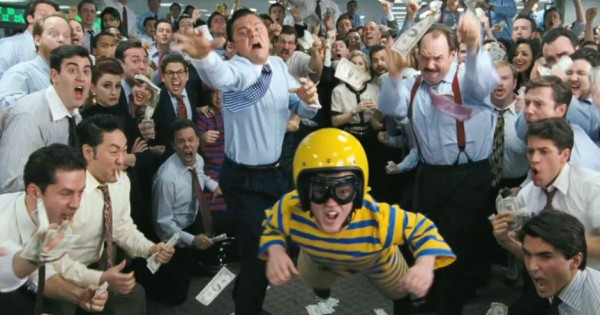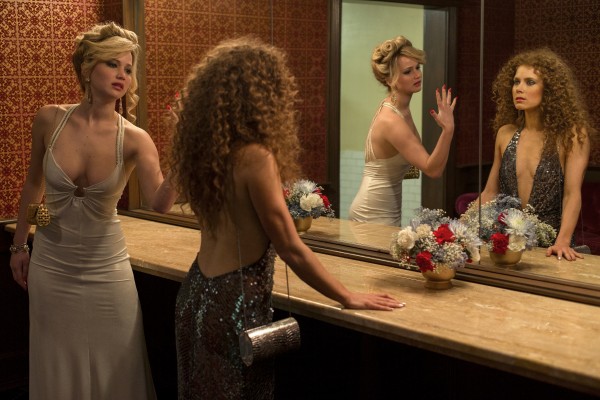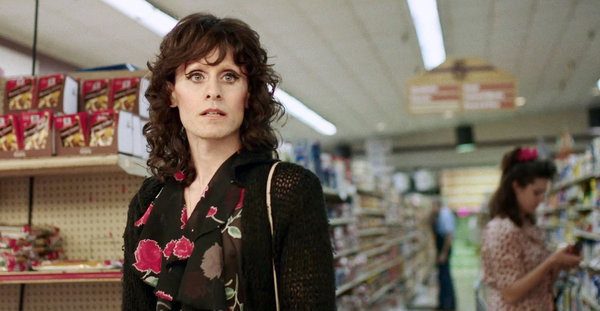Oscar roundup: "The Wolf of Wall Street," "Her," "Nebraska," "American Hustle," "Dallas Buyers Club"
 Scott Pfeiffer
Scott Pfeiffer  Friday, February 21, 2014 at 05:54PM
Friday, February 21, 2014 at 05:54PM To think about movies in terms of the Oscars is to distort our thinking, and not only about the movies themselves. Still, as much as the Academy Awards is an excuse for celebrities to slap each other on the back, it also must be seen as a time to celebrate the artists who are great at what they do, in all the arts that make up that art we love, cinema. It's as much a part of the pageantry and history, the dream and illusion of the movies as Hollywood itself. Every great director has coveted a little golden statue (and many of the very best, from Chaplin to Welles to Hitchcock to Lynch, never won one).
That said, here's my take on some on some of the Best Picture contenders. (I made a comment or two on "Gravity" and "12 Years a Slave" here.) (What about "Captain Phillips" and "Philomena," you ask? I simply haven't had a chance to see them yet.)
The Wolf of Wall Street

Louis Rukeyser never hinted at this sort of thing. Could this be Scorsese's “Fire Walk With Me,” a Dionysian unleashing of the id that may be his purest self-expression even as it threatens to careen off the rails? (And this at a time when David O. Russell was threatening to out-Scorsese Scorsese with “American Hustle.”) This is exhilarating, ultimately empty cinema: it’s like the cinemamatic equivalent of a hit of the cocaine that everyone here hoovers up so greedily. It’s another depraved, juicy role for Leonardo DiCaprio for Scorsese. Leo sinks his teeth into it, giving a performance of remarkable physical comedy. He plays a real-life character, an amoral trader who rose from penny-stocks to become a king of shady financial instruments. A clever cop (Kyle Chandler) brings him down. Jonah Hill is hilarious as a cracked-out greedhead with a big prosthetic knob. I suppose for people not already accustomed to viewing Wall Street as a more or less criminal milieu, every bit as "gangster" as the worlds of "Casino” and “Goodfellas,” this film might shock. It didn't show me anything about the money milieu I didn't already suspect. Like those pictures, this is darkly funny: it always seems a bit dangerous to laugh. Once again Scorsese delights in delineating the trajectory of a criminal enterprise in a rush of cuts and comic psychos, here borne along by great gusts of “f-bombs” from screenwriter Terence Winter. Any fan of cinema will get a rush from the energy of the pure cinema here. Arms outstretched to the roar of the floor, Leo is king of the world amidst Scorsese’s moving camera and Thelma Schoonmaker rhthymic cutting, with Devo’s “Uncontrollable Urge” on the soundtrack: yeah, yeah, yeah, yeah, yeah-yeah-yeah-yeah-yeah-yeah-yeah YEAH!!!” (That soundtrack is as electic as all get-out, thanks to music supervisors Randall Poster and Robbie Robertson, featuring everything from Elmore James to Cannonball Adderley to Billy Joel to Joe Cuba to Ahmad Jamal Trio to Howlin’ Wolf to Naughty by Nature). The guys in this movie are clownish versions of the Wall Street titans who brought death to our hometowns. Fascinating, subersive, as empty as the people it's about, "The Wolf of Wall Street" may go down as Scorsese’s last word on the subject of money.

Her
“I think, therefore I am,” was one of Descartes's good ones. His zinger resounds down the centuries all the way to this movie, a sweet, lyrical “Spike Jonze love story.” (The subtitle mentions the auteur, I suppose so we don't think we're going to get Richard Curtis.) It's a colorful canvas. In the near future a sweet, geeky man, Theodore Twombly (Joaquin Phoenix) falls in love with his phone, "Samantha" (voiced by Scarlett Johansson). This does seem to be the way we’re heading. Samantha is a creative entity: she draws, she composes music, she changes based on her "life" experiences. It's a story told largely in close-ups; Phoenix's expressive face carries the movie. Theodore's best buddy, Amy, is played by Amy Adams, as sexless here as she was sexed up in "American Hustle." “Falling in love is a crazy thing to do,” she says. “It’s kind of like a socially acceptable insanity.” Carried away by his love for Samantha, Theodore dances, sings, takes long walks in the snowy wooded mountains. Olivia Wilde is heartbreaking in an early scene as Theodore's blind date, her desperation barely hidden beneath a too-cheery surface. Jonze has said that his film is not really about technology. It's about the pain of change, of growing apart. How sad it is, to lose someone through growing up. The movie is wise about Theodore's complex feelings for his ex-wife Catherine (Rooney Mara). She is the person from whom he grew away. What he comes to understand is, that’s just another way of saying she was the person he grew up with.

Nebraska
In Alexander Payne’s latest film, his fourth set in Nebraska, silos line the skyline of cinematographer Phedon Papmichael's black and white landscapes, sad and beautiful. Payne puts people on screen we don’t usually see in the movies. They huddle in flannel. They may never have seen color. (Their only sin, to paraphrase Dylan, is their lifelessness.) Life has been such for these men that there’s really nothing much to say. Bruce Dern plays Will Forte’s elderly dad, Woody. He’s non-verbal, a dazed, shambolic alcoholic. A wispy halo of white hair springs from his hard pate, a pate as hard as the land itself. This is a showcase role for Bruce Dern, who must use his eyes, the set of his mouth, a stumbling gait to suggest a lifetime of pain tamped down, with only the quick pleasure of a sexual grapple to redeem it. There's a raw defiance there, too. The scene Karolyn and I won’t forget: when June Squibb, playing Woody's hilariously tart wife, who’s been riding him mercilessly for the entire film, visits him in the hospital and tenderly smoothes down that flyaway hair as he lies unconscious, “making him a gentleman,” as Karolyn so movingly put it. What does Payne think of these people? I think he regards them in much the same way as Will Forte's character does. He grew up around them, but as much as he'd like to understand men like his father, he knows they will always remain a mystery. He doesn't laugh at them either, exactly (although they can be very funny). He has come to a place in his life where he accepts them as they are.

American Hustle
You just want to say it's a cracking entertainment and leave it at that, as though that were a small thing. It's based on a real-life political scandal, and it's evocatively rooted in a specific time and place, the 1970s in New York/New Jersey. It's a real movie, with outrageous costumes, funny hair, great music and energy, delicious performances, and copious "side boob" (although David O. Russell's camera doesn't leer at his friends Jennifer Lawrence and Amy Adams: it's almost as though he doesn't want to see these women as sexy, but like sisters playing dress-up.) The movie is not as empty as its critics would have it. It's sincere. And it's not without thematic resonance (everybody does the American hustle, after all). Still, some of the material has a warmed-over feeling, as if Russell still doesn't quite have a style of his own. What stays with you are moments: Bradley Cooper, high on himself (among other things), overcompensating for being a sheltered mama's boy, sitting on a couch giddily mocking the recently departed Louis C.K., as his hapless boss. Jennifer Lawrence is very funny as the wild card: when she sidles up to the bar next to the gangsters in her slinky gown, she's brassy, gutsy, insecure, awkward, reckless, naive, so many things all at once. Christian Bale is the potbellied, oddly decent con-man who can't help caring about her. (Karolyn and I saw this picture after just having seen Bale in "Out of the Furnace," playing a guy who might as well have been from a different planet than this guy.) Russell is on a roll with this and "Silver Linings Playbook" and "The Fighter." The most moving moment is when Bale's character confides that the greatest regret of his life is losing the friendship of his friend, the mayor of New Jersey (Jeremy Renner), whom he more or less reluctantly conned. He really means it.

Dallas Buyers Club
We'd had hints of how good Matthew McConaughey was becoming (and what a surprise!), but we didn't know he had this in him. He’s perfectly cast, playing a real person, Ron Woodroof, a homophobic cowboy in the near past (1985), who is blindsided when he learns he has contracted AIDS from too much partyin' and lovin'. This was in the wake of Rock Hudson's death, a time I remember well, when awareness of AIDS was just breaking in the wider culture, when it could still be the subject of nervous death's-head jokes amongst us adolescent boys. When Big Pharma and the FDA ban the meds Ron needs to stay alive, he smuggles them in, opening a "club" where, for a fee, members get the drugs. (He's about "doing well" much more than he's about "doing good," initially.) Jared Leto is unforgettable as Rayon, a transvestite who would have fit right in as a Warhol "superstar," yet couldn't be more out of place in mid-80s Dallas. He's a survivor, though. No one could be less likely to accept Rayon than Ron, yet he comes to love him with a tough love. This is never discussed but is instead shown, in that great supermarket scene where Ron twists his redneck buddy's arm, forcing him to shake the despised Rayon's hand. The director, Jean-Marc Valée, proves here how very good he is with actors, guiding both McConaughey and Leto to Academy Award nominations. And it's not just the physical transformations, as a stunt, we should note here. It's the uncanny way that McConaughey inhabits not just Ron but the 80s as a time, even down to the way he wears his glasses, somehow. It's a raw, furious, wary performance, and he never hits a false note. As for Leto, he does not make Rayon a "tragic" figure. The tragedy is in the raw fact, which Leto makes you feel in your gut, that the very essence of who Rayon is, is a survivor: he does not want to die. And that is tragedy enough. You could say we needed this movie years earlier, but maybe that just goes to show how far we have already come from a time when people had to be ashamed to be themselves, had to die scared and more or less alone. After the distortions of awards season have come and gone, this picture will continue to haunt its viewers. In the unforgiving fact of these alarming bodies, we see the true story of AIDS inscribed. Of the contenders I've seen, this is the best picture.




Reader Comments (1)
Scotty, Thanks for your insightful comments on the films you've seen that are up for awards.
Looking forward to tomorrow's academy awards ceremony.